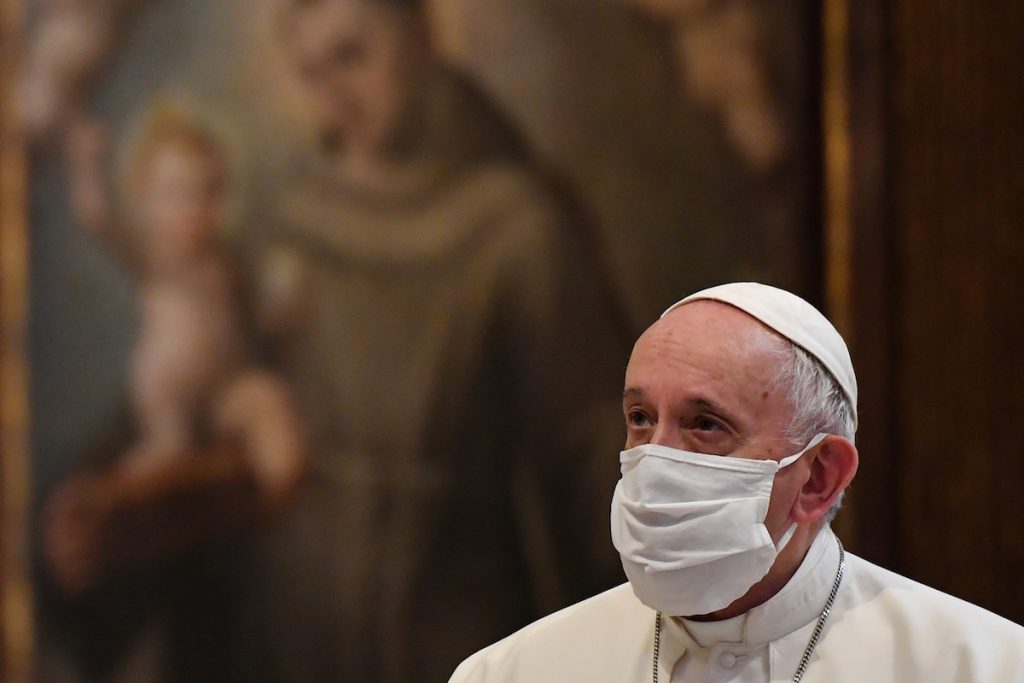
A defense attorney in a major Vatican finance trial has questioned Pope Francis’ role in the controversial London deal, after a prosecutor allegedly interrogated the pope about the case.
The Vatican tribunal met for two and a half hours on Nov. 17 in the ongoing trial related to the Secretariat of State’s 350 million euro (US$404 million) purchase of a London investment property. Like prior court dates, the hearing was devoted to requests by defense attorneys to dismiss the case.
Tribunal president Giuseppe Pignatone said on Wednesday that he would rule on Dec. 1 on the defense’s new request to nullify an indictment, after he already threw out several of the indictments against a number of the original 10 defendants on procedural grounds.
While the prosecutor’s office — called the Promoter of Justice — decides whether to re-do the investigations and again present the dismissed indictments, the trial proceeds with six defendants, including Cardinal Angelo Becciu, the highest-ranking cleric to be tried by the tribunal of Vatican City State in recent history.
At Wednesday’s hearing, the lawyer for defendant Enrico Crasso, a long-time investment manager for the Vatican, presented the court with a note outlining the results of a technical analysis of video evidence.
The analysis, according to defense lawyer Luigi Panella, found numerous “omissions” in the recordings of depositions, which the prosecution had handed over to the defense at the court’s order on Nov. 3.
Some of the video recordings are interviews with Msgr. Alberto Perlasca, the former head of the administrative office at the Secretariat of State, whose testimony is central to the prosecution’s case.
Perlasca, once a suspect in the Vatican’s investigations, has not been charged with any crimes since voluntarily submitting himself to extensive questioning in 2020 and 2021.
Crasso’s lawyer also objected to an alleged conversation between Vatican prosecutor Alessandro Diddi and Pope Francis, who is legally outside the court’s jurisdiction.
Panella submitted transcripts of part of an April 29, 2020, interrogation of Perlasca by Diddi and Vatican gendarme Stefano De Santis.
According to the transcript, copies of which were also provided to the media, Perlasca stated that directions to deal with businessman Gianluigi Torzi, who brokered the final stage in the Vatican’s purchase of the London property — earning himself 10 million euros (US$11.3 million) in the process — came “from above.” (The video allegedly shows that Perlasca pointed upward with his right index finger while speaking.)
When asked if he meant orders came from Pope Francis, Perlasca replied, “Certainly.”
According to the transcript, prosecutor Diddi responded to Perlasca’s statement by saying: “The Holy Father did not say: ‘Negotiate with Torzi.’”
A short time later, Diddi again interrupted Perlasca, and said: “Monsignor, it does not matter! Before doing what we are doing we went to the Holy Father and asked him what happened and I can disbelieve everyone except the Holy Father…”
Other witnesses have supported Perlasca’s testimony, with one former official of the Secretariat of State indicating in 2020 that “the need for negotiations with Torzi” had been decided, “with the endorsement of the Holy Father.”
Diddi said on Wednesday that he did not interrogate Pope Francis, but that his comments referred to statements the pope made during his in-flight press conference from Japan to Rome on Nov. 26, 2019.
On that occasion, Pope Francis said: “The Promoter of Justice studied the accusations, consulted, and saw an imbalance in the budget. And then, he asked me for permission to carry out the searches. I said: ‘Is it clear, your report?’ He told me: ‘Yes, there is a presumption of corruption in these cases. I should carry out searches in this office, this office, and this office.’ And I signed the authorization.”
Defense lawyer Panella saw it differently. He noted that the Vatican’s legal code, which is from 1913, says that the pope, as sovereign, cannot testify. But, the attorney argued, since the law originates with the pope, by giving his testimony, Pope Francis automatically rendered his own statements admissible under the law.
Thus, Panella contested, the evidence provided to the defense should still be considered incomplete, and constitutes another reason why the tribunal should rule to dismiss the trial.
“We are therefore once again faced with peculiarities of this procedure determined by interventions in it by the Holy Father … which lead us to doubt the respect for the principles of due process and the fundamental rights of the accused,” Panella wrote in his note to the court.
Pignatone said that he would give his ruling on the defense’s requests to dismiss the trial on procedural grounds at the next hearing, set for Dec. 1.
“It’s clear we need more time before starting. If we manage to start,” Pignatone told the court.
Source: Licas Philippines
0 Comments